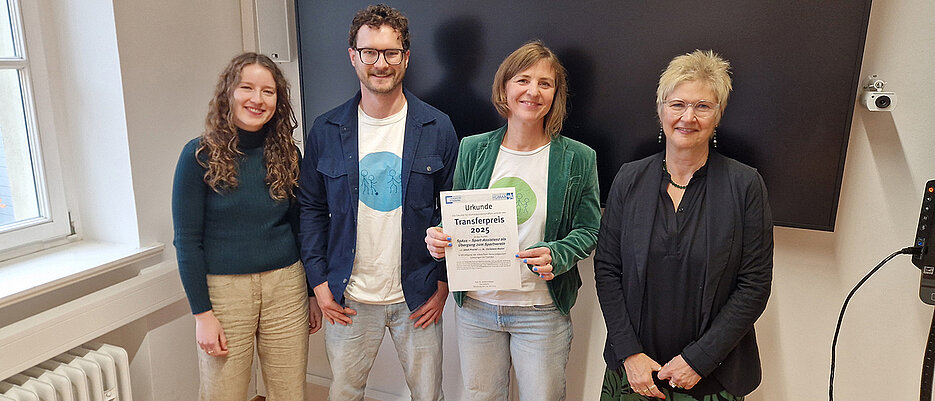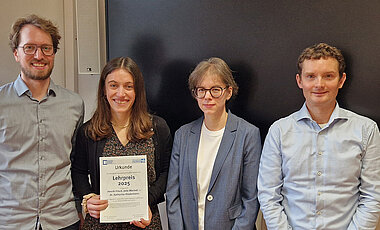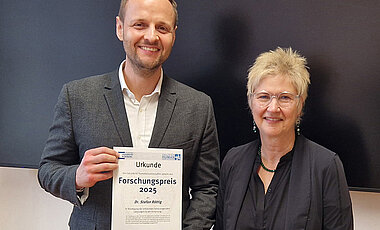Premiere: Faculty of Human Sciences Awards Transfer Prize
11/11/2025The successful SpAss" project combines science and social participation. The research and teaching prizes were also awarded.

The Faculty of Human Sciences at Julius-Maximilians-Universität Würzburg presented three academic awards at its Faculty Council meeting on 22 October 2025. In addition to the traditional research and teaching prize, the newly created transfer prize was presented for the first time.
Dr Stefan Röttig received the research prize for his outstanding work on ancient philosophy, in particular his internationally acclaimed dissertation on Seneca's ethics. Another research prize went to Dr Caroline Theurer for her diverse projects on the diagnosis and promotion of digital skills in primary school children. The teaching prize went to the interdisciplinary team led by Henrik Frisch, Julia Warmdt and Dr Katharina Kindermann for their innovative seminar on creating digital picture books for inclusive teaching. 130 students supported the team's nomination and praised the successful combination of theory and practice.
Premiere of the Transfer Prize: Science for Society
Special attention was paid to the premiere of the Transfer Prize, with which the faculty honoured projects that shape the "imaginary third space between university and society" for the first time - in line with the university motto "Science for Society".
Seven projects from different chairs applied for the award, which is endowed with 1,000 euros. The spectrum ranged from the Würzburg mobility survey and virtual reality applications to the centre for the promotion of young female talent and the World Usability Day Würzburg. "The number of applications impressively demonstrates the interconnectedness and commitment of our faculty with and for the society around us," emphasises Dean Professor Andrea Kübler.
"SpAss" Impresses with its Sustainable Inclusion Approach
The first transfer prize was awarded to the project "Sportassistenz als Übergang zum Sportverein (SpAss)" by Dr Christiane Reuter and Jakob Prechtl. The project qualifies people according to scientific standards to become sports assistants who accompany people with disabilities in participating in sports activities close to home and thus make a contribution to an inclusive society.
The jury was particularly impressed by the innovative approach in a previously underserved area. "In an impressive way, university knowledge is being harnessed and harnessed for non-university society with the aim of sustainably improving the status quo for people at risk of marginalisation," said Andrea Kübler in her laudatory speech.
Strong Partnerships with Business and Associations
Another plus point of the project is the successful collaboration with non-university partners. The sporting goods manufacturer Adidas not only supports the project with its volunteering programme and provides resources and expertise, but also has its own employees trained as assistants. There is also close cooperation with the Behinderten-Rehabilitations-Sportverband Bayern e.V. (Bavarian Disabled Rehabilitation Sports Association).
"Resources and expertise flow in both directions here," says Andrea Kübler, praising this mutual cooperation. Despite the fact that the project is still in its infancy, concrete structures are already being created to increase the participation of people with disabilities in sport.
Sustainable Structures Beyond the End of the Project
The jury was particularly impressed by the aspect of "self-sustaining independence": the resources and structures created in the project are anchored in such a way that they can continue to exist and develop independently even after the end of the project. "We see this project as a prime example of successful transfer from the ranks of our faculty," summarised Andrea Kübler.
By awarding the Transfer Prize for the first time, the Faculty of Human Sciences is emphasising its self-image as a socially committed institution that combines academic excellence with practical relevance. The award is to be presented regularly in future and encourage further projects to build bridges between research and social practice.










